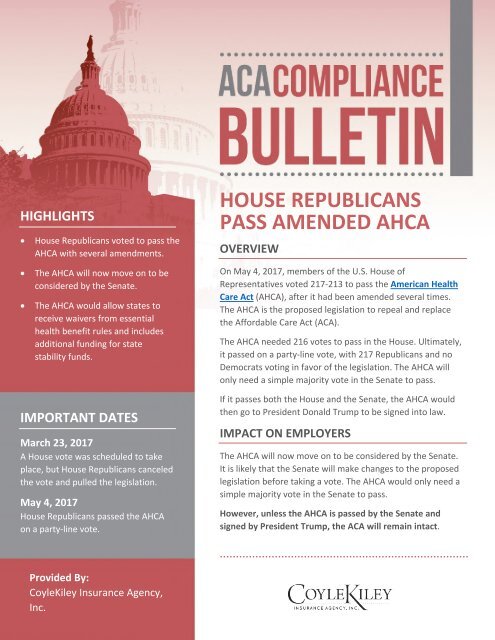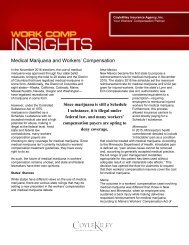House Republicans Pass Amended AHCA 5-4-17
You also want an ePaper? Increase the reach of your titles
YUMPU automatically turns print PDFs into web optimized ePapers that Google loves.
HIGHLIGHTS<br />
<br />
<br />
<br />
<strong>House</strong> <strong>Republicans</strong> voted to pass the<br />
<strong>AHCA</strong> with several amendments.<br />
The <strong>AHCA</strong> will now move on to be<br />
considered by the Senate.<br />
The <strong>AHCA</strong> would allow states to<br />
receive waivers from essential<br />
health benefit rules and includes<br />
additional funding for state<br />
stability funds.<br />
IMPORTANT DATES<br />
March 23, 20<strong>17</strong><br />
A <strong>House</strong> vote was scheduled to take<br />
place, but <strong>House</strong> <strong>Republicans</strong> canceled<br />
the vote and pulled the legislation.<br />
May 4, 20<strong>17</strong><br />
<strong>House</strong> <strong>Republicans</strong> passed the <strong>AHCA</strong><br />
on a party-line vote.<br />
HOUSE REPUBLICANS<br />
PASS AMENDED <strong>AHCA</strong><br />
OVERVIEW<br />
On May 4, 20<strong>17</strong>, members of the U.S. <strong>House</strong> of<br />
Representatives voted 2<strong>17</strong>-213 to pass the American Health<br />
Care Act (<strong>AHCA</strong>), after it had been amended several times.<br />
The <strong>AHCA</strong> is the proposed legislation to repeal and replace<br />
the Affordable Care Act (ACA).<br />
The <strong>AHCA</strong> needed 216 votes to pass in the <strong>House</strong>. Ultimately,<br />
it passed on a party-line vote, with 2<strong>17</strong> <strong>Republicans</strong> and no<br />
Democrats voting in favor of the legislation. The <strong>AHCA</strong> will<br />
only need a simple majority vote in the Senate to pass.<br />
If it passes both the <strong>House</strong> and the Senate, the <strong>AHCA</strong> would<br />
then go to President Donald Trump to be signed into law.<br />
IMPACT ON EMPLOYERS<br />
The <strong>AHCA</strong> will now move on to be considered by the Senate.<br />
It is likely that the Senate will make changes to the proposed<br />
legislation before taking a vote. The <strong>AHCA</strong> would only need a<br />
simple majority vote in the Senate to pass.<br />
However, unless the <strong>AHCA</strong> is passed by the Senate and<br />
signed by President Trump, the ACA will remain intact.<br />
Provided By:<br />
CoyleKiley Insurance Agency,<br />
Inc.
Legislative Process<br />
The <strong>AHCA</strong> is budget reconciliation legislation, so it cannot fully repeal the ACA. Instead it is limited to<br />
addressing ACA provisions that directly relate to budgetary issues—specifically, federal spending and taxation.<br />
A full repeal of the ACA must be introduced as a separate bill that would require 60 votes in the Senate to<br />
pass.<br />
Since the <strong>AHCA</strong> was introduced, it has been amended several times. To address concerns raised by both<br />
Democrats and fellow <strong>Republicans</strong>, the <strong>House</strong> Republican leadership released amendments to the legislation<br />
on March 20, 20<strong>17</strong>, followed by a second set of amendments on March 23, 20<strong>17</strong>. On March 23, 20<strong>17</strong>, <strong>House</strong><br />
leadership withdrew the <strong>AHCA</strong> before taking a vote. After the withdrawal, <strong>Republicans</strong> made additional<br />
amendments (the MacArthur amendments) to the <strong>AHCA</strong>, followed by a separate corrective amendment. A<br />
new <strong>House</strong> vote was scheduled for May 4, 20<strong>17</strong>, which resulted in a 2<strong>17</strong> to 213 vote to pass the <strong>AHCA</strong>.<br />
The <strong>AHCA</strong> will now move on to be considered by the Senate. It is likely that the Senate will make changes to<br />
the proposed legislation before taking a vote. The <strong>AHCA</strong> would only need a simple majority vote in the Senate<br />
to pass. However, unless the <strong>AHCA</strong> is passed by the Senate and signed by President Trump, the ACA will<br />
remain intact.<br />
ACA Provisions Not Impacted<br />
The majority of the ACA would not be affected by the <strong>AHCA</strong>. The MacArthur amendments specifically maintain<br />
most of the ACA’s market reforms. For example, the following key ACA provisions would remain in place:<br />
Cost-sharing limits on essential health benefits (EHBs) for non-grandfathered plans (currently $7,150<br />
for self-only coverage and $14,300 for family coverage)<br />
Prohibition on lifetime and annual limits for EHBs<br />
Requirements to cover pre-existing conditions<br />
Coverage for adult children up to age 26<br />
Guaranteed availability and renewability of coverage<br />
Nondiscrimination rules (on the basis of race, nationality, disability, age or sex)<br />
Prohibition on health status underwriting<br />
Age rating restrictions would also continue to apply, with the age ratio limit being revised to 5:1 (instead of<br />
3:1), and states would be allowed to set their own limits. The MacArthur amendments also reinstate EHBs as<br />
the federal standard, eliminating a prior controversial amendment to the <strong>AHCA</strong>, although states may obtain<br />
waivers from these rules.<br />
This ACA Compliance Bulletin is not intended to be exhaustive nor should any discussion or opinions be construed as legal<br />
advice. Readers should contact legal counsel for legal advice.<br />
2<br />
© 20<strong>17</strong> Zywave, Inc. All rights reserved.
Repealing the Employer and Individual Mandates<br />
The ACA imposes both an employer and individual mandate. The <strong>AHCA</strong> would reduce the penalties imposed<br />
under these provisions to zero beginning in 2016, effectively repealing both mandates (although they would<br />
technically still exist).<br />
However, beginning with open enrollment for 2019, the <strong>AHCA</strong> would allow issuers to add a 30 percent lateenrollment<br />
surcharge to the premium cost for any applicants that had a lapse in coverage for greater than 63<br />
days during the previous 12 months. The late-enrollment surcharge would be discontinued after 12 months.<br />
Replacing Health Insurance Subsidies with Tax Credits<br />
The ACA currently offers federal subsidies in the form of premium tax credits and cost-sharing reductions to<br />
certain low-income individuals who purchase coverage through the Exchanges. The <strong>AHCA</strong> would repeal both<br />
of these subsidies, effective in 2020, and replace them with a portable, monthly tax credit for all individuals<br />
that could be used to purchase individual health insurance coverage.<br />
The <strong>AHCA</strong> would also repeal the ACA’s small business tax credit beginning in 2020. In addition, under the<br />
<strong>AHCA</strong>, between 2018 and 2020, the small business tax credit generally would not be available with respect to<br />
a qualified health plan that provides coverage relating to elective abortions.<br />
State Waivers<br />
The MacArthur amendments include an option for states to obtain limited waivers from certain federal<br />
standards, in an effort to lower premiums and expand the number of insured. Under this option, states could<br />
apply for waivers from the ACA’s EHB requirement and community rating rules, except that states could not<br />
allow rating based on:<br />
Gender;<br />
Age (except for reductions in the 5:1 ratio already included by the <strong>AHCA</strong>); or<br />
Health status (unless the state established a high-risk pool or is participating in a federal high-risk<br />
pool).<br />
To receive the waiver, states would need to attest that the purpose of the waiver is to reduce premium costs,<br />
increase the number of individuals with health coverage or advance another benefit to the public interest in<br />
the state (including guaranteed coverage for individuals with pre-existing condition exclusions).<br />
State Stability Fund<br />
The last set of corrective amendments to the <strong>AHCA</strong> establishes a Patient and State Stability Fund for 2018<br />
through 2023. This fund is intended to provide an additional $8 billion to states that have applied for, and<br />
been granted, a waiver from community rating, as specified by the MacArthur amendments.<br />
This ACA Compliance Bulletin is not intended to be exhaustive nor should any discussion or opinions be construed as legal<br />
advice. Readers should contact legal counsel for legal advice.<br />
3<br />
© 20<strong>17</strong> Zywave, Inc. All rights reserved.
The funds would be required to be used in “providing assistance to reduce premiums or other out-of-pocket<br />
costs” of individuals who may be subject to an increase in their monthly premium rates because they:<br />
Reside in a state with an approved waiver;<br />
Have a pre-existing condition;<br />
Are also uninsured because they have not maintained continuous coverage; and<br />
Purchase health care in the individual market.<br />
Enhancements to Health Savings Accounts (HSAs)<br />
HSAs are tax-advantaged savings accounts tied to a high deductible health plan (HDHP), which can be used to<br />
pay for certain medical expenses. To incentivize use of HSAs, the <strong>AHCA</strong> would:<br />
Increase the maximum HSA contribution limit: The HSA contribution limit for 20<strong>17</strong> is $3,400 for selfonly<br />
coverage and $6,750 for family coverage. Beginning in 2018, the <strong>AHCA</strong> would allow HSA<br />
contributions up to the maximum out-of-pocket limits allowed by law (at least $6,550 for self-only<br />
coverage and $13,100 for family coverage).<br />
Allow both spouses to make catch-up contributions to the same HSA: The <strong>AHCA</strong> would allow both<br />
spouses of a married couple to make catch-up contributions to one HSA, beginning in 2018, if both<br />
spouses are eligible for catch-up contributions and either has family coverage.<br />
Address expenses incurred prior to establishment of an HSA: Under the <strong>AHCA</strong>, starting in 2018, if an<br />
HSA is established within 60 days after an individual’s HDHP coverage begins, the HSA funds would be<br />
able to be used to pay for expenses incurred starting on the date the HDHP coverage began.<br />
Relief from ACA Tax Changes<br />
The <strong>AHCA</strong> would provide relief from many of the ACA’s tax provisions. The amendments made to the <strong>AHCA</strong><br />
accelerated this relief by one year for most provisions, moving the effective dates for repeal up to 20<strong>17</strong>. The<br />
affected tax provisions include the following:<br />
Cadillac tax: The ACA imposes a 40 percent excise tax on high cost employer-sponsored health<br />
coverage, effective in 2020. The <strong>AHCA</strong> would change the effective date of the tax, so that it would<br />
apply only for taxable periods beginning after Dec. 31, 2025.<br />
Restrictions on using HSAs for over-the-counter (OTC) medications: The ACA prohibits taxpayers from<br />
using certain tax-advantaged HSAs to help pay for OTC medications. The <strong>AHCA</strong> would allow these<br />
accounts to be used for OTC purchases, beginning in 20<strong>17</strong>.<br />
This ACA Compliance Bulletin is not intended to be exhaustive nor should any discussion or opinions be construed as legal<br />
advice. Readers should contact legal counsel for legal advice.<br />
4<br />
© 20<strong>17</strong> Zywave, Inc. All rights reserved.
Increased tax on withdrawals from HSAs: Distributions from an HSA (or Archer MSA) that are not used<br />
for qualified medical expenses are includible in income and are generally subject to an additional tax.<br />
The ACA increased the tax rate on distributions that are not used for qualified medical expenses to 20<br />
percent. The <strong>AHCA</strong> would lower the rate to pre-ACA percentages, beginning with distributions in 20<strong>17</strong>.<br />
Health flexible spending account (FSA) limit: The ACA limits the amount an individual may contribute<br />
to a health FSA to $2,500 (as adjusted each year). The <strong>AHCA</strong> would repeal the limitation on health FSA<br />
contributions for taxable years beginning in 20<strong>17</strong>.<br />
Additional Medicare tax: The ACA increased the Medicare tax rate for high-income individuals,<br />
requiring an additional 0.9 percent of wages, compensation and self-employment income over certain<br />
thresholds to be withheld. The <strong>AHCA</strong> would repeal this additional Medicare tax beginning in 2023.<br />
Deduction limitation for Medicare Part D subsidy: The ACA eliminated the ability for employers<br />
receiving the retiree drug subsidy to take a tax deduction on the value of this subsidy. Effective in 20<strong>17</strong>,<br />
the <strong>AHCA</strong> would repeal this ACA change and reinstate the business-expense deduction for retiree<br />
prescription drug costs without reduction by the amount of any federal subsidy.<br />
Beginning after Dec. 31, 2016, the <strong>AHCA</strong> would also repeal the medical devices excise tax, the health insurance<br />
providers fee and the fee on certain brand pharmaceutical manufacturers. The 10 percent sales tax on indoor<br />
tanning services would be repealed effective June 30, 20<strong>17</strong>, to reflect the quarterly nature of this collected<br />
tax. Finally, the <strong>AHCA</strong> would also reduce the medical expense deduction income threshold to 5.8 percent<br />
(lower than the pre-ACA level of 7.5 percent), beginning in 20<strong>17</strong>.<br />
Modernize Medicaid<br />
The <strong>AHCA</strong> would repeal the ACA’s Medicaid expansion, and make certain other changes aimed at modernizing<br />
and strengthening the Medicaid program. The amendments to the <strong>AHCA</strong> made a number of modifications to<br />
the proposed Medicaid changes. For example, the <strong>AHCA</strong> would provide enhanced federal payments to states<br />
that already expanded their Medicaid programs, and then transition Medicaid’s financing to a “per capita<br />
allotment” model starting in 2020, where per-enrollee limits would be imposed on federal payments to states.<br />
It would also allow states the option to implement a work requirement for nondisabled, nonelderly,<br />
nonpregnant adults as a condition for receiving Medicaid coverage.<br />
The <strong>AHCA</strong> would also modernize Medicaid’s data and reporting systems, repeal the ACA’s disproportionate<br />
share hospital (DSH) cuts and make changes to the process for eligibility determinations.<br />
This ACA Compliance Bulletin is not intended to be exhaustive nor should any discussion or opinions be construed as legal<br />
advice. Readers should contact legal counsel for legal advice.<br />
5<br />
© 20<strong>17</strong> Zywave, Inc. All rights reserved.





